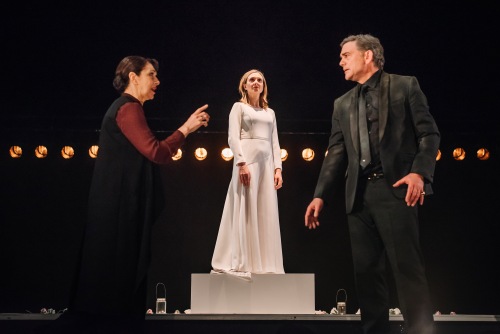“Go with an expressive meld of The Proclaimer’s evergreen ‘I’m Gonna Be’ and the absolute integrity of Paulina”
Editorial Rating: 5 Stars: Nae Bad
Accept that the Oracle at Delphi is a DNA lab – and why not? – and that no Bohemian sheep shearing feast is complete without See You Jimmy hats – ‘perhaps the most potent symbol of national self mockery in the world’ – and then you create a ‘Winter’s Tale’ to die for. And indeed little Mamillius does die, and the good lord Antigonus does get ripped apart by a bear, but that’s tragicomedy for you: part psychodrama, part romance, and now part ceilidh; all startlingly well realized in this Lyceum production, directed by Max Webster, designed by Fly Davis and with music by Alasdair Macrae.
Delphic maxim, admonition and genetic instruction, the aphorism ‘Know thyself’ would be a three-in-one cure all for Leontes, King of Sicilia. He might have found the motto in his Christmas cracker. Unfortunately, he doesn’t and goes insanely jealous instead: losing his wife, his son, his new born daughter and his best friend in the process. That’s roughly half the play, an hour or so, and then after the (16 year) interval there’s sixty minutes of making jolly good, when that lost daughter finds her Prince, the friends are reconciled and – miraculously – love between husband and wife is restored. Sweet? Nah, not when Jimmy Chisholm’s Autolycus is around, fleecing ordinary folk, pinching their gold, selling dodgy CDs and hawking his ‘delicate burdens of dildoes and fadings’ (that’s Shakespeare, not James Robertson’s proud and vernacular Scots). If it’s continuity you’re after, to oppose Leontes’ psychosis, then go with an expressive meld of The Proclaimer’s evergreen ‘I’m Gonna Be’ and the absolute integrity of Paulina (Maureen Beattie), as audacious in the face of power as you could wish woman to be.
The Winter’s Tale is late Shakespeare so it’s always interesting to see how a thoughtful production brings its mature ‘status’ into play. Rulers, Polixenes (Andy Clark) as well as Leontes, are petty tyrants in this telling. They act beyond reason, expecting loyalty and deserving none. Their women are their subjects. When Hermione (Frances Grey) pleads her innocence she knows that Leontes, husband, judge, and executioner, speaks a ‘language that I understand not; [that] My life stands in the level of your dreams’. In 1611 it was possible, and probably necessary, to admit that Leontes has regained his authority by the final scene; but not in 2017. The deluded male is busted and a near broken John Michie does it very well. It’s the same with position and rank, for who would be liege-men to lords such as these? Prince Florizel’s love for his common shepherdess (tho’ she’s not really!) cannot be doubted and Bohemia looks just the kind of subversive place where young people should grow up.
The binary nature of the piece – Sicilia vs. Bohemia – locks it together. One is urban and a touch swanky with its musicians in a recording booth, expensive and insulated; whilst over in Bohemia, or is it in a field near Auchtermuchty?, Autolycus is on the make and Annie Grace plays her Border pipes on a makeshift platform and it’s all in for a Canadian Barn Dance. Perdita (Fiona Wood), pranked up in her goddess claithes and pink Converses, is made-for-Fife. ‘Too noble for this place’ reckons Polixenes. Prat!
Yes, judgements come fast and sure in this tale. The opening signal is a beautiful arrangement of ‘In the Bleak Mid-Winter’, whose plaintive ‘What can I give him?’ is Hermione’s anguished, unanswerable question. Mamillius is the sacrificial lamb – and bear. Rustics, pre-eminently John Stahl as the Shepherd are as funny, honest and whole hearted as they are gullible and foolish. Autolycus, complete with paper crown around his neck, is the disgraceful Lord of Misrule, whom you shouldn’t care about, just delight in.
What is apparent throughout is clear-cut. Indeed there’s a thematic insistence upon narrative clarity and serious moral direction that other productions can lose sight of. No chance here: not only is the lighting plot instructive, there’s even an ultrasound to pay attention to and, remarkably, an apt reference to the human genome project:
‘Your mother was most true to wedlock, prince;
For she did print your royal father off,
Conceiving you.’
Invention does not diminish Shakespeare.
Reviewer: Alan Brown (Seen 14 February)
Go to The Winter’s Tale at the Lyceum
Visit Edinburgh49 at The Lyceum archive.





You must be logged in to post a comment.